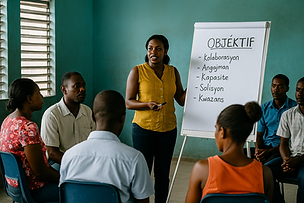
-R%C3%A9cup%C3%A9r%C3%A9.png)
The solution to the problem of insecurity in Haiti must come from the Haitian people, with the support of their true allies
📑 **Manifesto Summary**
• The observation
• Economic and social costs
• Mobilization in the face of insecurity
• Conditions for success
• National reconciliation
• Perspectives
The observation

Haiti is today a country dominated by armed violence. Armed criminal groups control vast swathes of the national territory and impose their dictates on the population, sometimes in collusion with segments of the economic and political elite.
The Haitian state, weakened and dysfunctional, is no longer able to fulfill its sovereign functions, including public security, justice, and respect for fundamental rights. The national police, underequipped and demoralized, is incapable of coping with the scale of the phenomenon.
This situation has led to the collapse of institutions, the paralysis of the economy, the closure of many schools and hospitals, and increased poverty, hunger, and despair. It has forced many Haitians to flee their country in often tragic conditions.
In the face of this national tragedy, inaction, resignation, or flight are not options. Action is imperative, here and now.
Economic and social costs
Widespread insecurity is creating considerable costs for Haitian society.
It paralyzes economic activity, leads to the closure of businesses, the loss of thousands of jobs, a fall in investment, rising prices, and worsening poverty.
It weighs on public finances, as state resources are squandered or wasted, while tax revenues collapse.
It has an immense human cost: thousands of dead, injured, traumatized, displaced families, children out of school, women raped.
It undermines social cohesion, favors the law of the strongest, and destroys the very foundations of living together.

Mobilization in the face of insecurity
.png)
Faced with this dramatic situation, national mobilization is essential.
It must rely on Haitian society itself, on its vital forces, on its youth, on its diaspora, on its capacity for resilience and solidarity.
It is about establishing a popular, civic, non-partisan and unarmed organization, capable of supporting the institutions, occupying abandoned land, and restoring a minimum of order and security.
This mobilization must be part of the Haitian Constitution, in particular Article 52.3, which provides for civic service.
It requires a coordinated, disciplined, supervised effort, at the national and local levels, with precise objectives, appropriate means, and rigorous ethics.
Conditions for success
To succeed, this citizen mobilization must be based on a few fundamental principles:
• Legitimacy based on the general interest, national emergency and the Constitution
• Political neutrality, to avoid partisan exploitation
• Effective coordination between the actors involved
• Strict supervision to avoid excesses
• Minimal training of participants
• Transparency in resource management
• Voluntary membership, with broad popular support
It is essential to define a clear framework, a flexible but structured organization, shared responsibilities, and monitoring and evaluation tools.

National reconciliation

The Citizens' Initiative for Security and Peace (ICiSP) is part of a vision of national reconciliation.
It does not aim to replace the State, nor to maintain confrontation, but to allow Haitian society to regain initiative, restore confidence, and support legitimate institutions.
It calls for a sacred union beyond political, ideological, social or regional divisions, around a common vital objective: restoring the security and dignity of the Haitian people.
It aims to be inclusive, open, non-violent, rooted in the values of solidarity, justice, respect, and love of country.
Perspectives
The Citizens' Initiative for Security and Peace (ICiSP) is part of a vision of national reconciliation.
It does not aim to replace the State, nor to maintain confrontation, but to allow Haitian society to regain initiative, restore confidence, and support legitimate institutions.
It calls for a sacred union beyond political, ideological, social or regional divisions, around a common vital objective: restoring the security and dignity of the Haitian people.
It aims to be inclusive, open, non-violent, rooted in the values of solidarity, justice, respect, and love of country.

